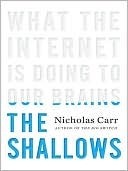More on this book
Community
Kindle Notes & Highlights
Read between
April 16 - May 16, 2021
For the last five centuries, ever since Gutenberg’s printing press made book reading a popular pursuit, the linear, literary mind has been at the center of art, science, and society. As supple as it is subtle, it’s been the imaginative mind of the Renaissance, the rational mind of the Enlightenment, the inventive mind of the Industrial Revolution, even the subversive mind of Modernism. It may soon be yesterday’s mind.
“If the experience of modern society shows us anything,” observes the political scientist Langdon Winner, “it is that technologies are not merely aids to human activity, but also powerful forces acting to reshape that activity and its meaning.”13
The growth in our online time has, in other words, expanded the total amount of time we spend in front of screens. According to an extensive 2009 study conducted by Ball State University’s Center for Media Design, most Americans, no matter what their age, spend at least eight and a half hours a day looking at a television, a computer monitor, or the screen of their mobile phone.
The shift from paper to screen doesn’t just change the way we navigate a piece of writing. It also influences the degree of attention we devote to it and the depth of our immersion in it.
Whenever we turn on our computer, we are plunged into an “ecosystem of interruption technologies,”
Steven Johnson, in his 2005 book Everything Bad Is Good for You, contrasted the widespread, teeming neural activity seen in the brains of computer users with the much more muted activity evident in the brains of book readers. The comparison led him to suggest that computer use provides more intense mental stimulation than does book reading. The neural evidence could even, he wrote, lead a person to conclude that “reading books chronically understimulates the senses.”11
But while Johnson’s diagnosis is correct, his interpretation of the differing patterns of brain activity is misleading. It is the very fact that book reading “understimulates the senses” that makes the activity so intellectually rewarding. By allowing us to filter out distractions, to quiet the problem-solving functions of the frontal lobes, deep reading becomes a form of deep thinking. The mind of the experienced book reader is a calm mind, not a buzzing one. When it comes to the firing of our neurons, it’s a mistake to assume that more is better.
When we read a book, the information faucet provides a steady drip, which we can control by the pace of our reading. Through our single-minded concentration on the text, we can transfer all or most of the information, thimbleful by thimbleful, into long-term memory and forge the rich associations essential to the creation of schemas. With the Net, we face many information faucets, all going full blast. Our little thimble overflows as we rush from one faucet to the next. We’re able to transfer only a small portion of the information to long-term memory, and what we do transfer is a jumble of
...more
Try reading a book while doing a crossword puzzle; that’s the intellectual environment of the Internet.
As Maggie Jackson explains in Distracted, her book on multitasking, “the brain takes time to change goals, remember the rules needed for the new task, and block out cognitive interference from the previous, still-vivid activity.”31
The results also reinforce something that Nielsen wrote in 1997 after his first study of online reading. “How do users read on the web?” he asked then. His succinct answer: “They don’t.”38
indeed there are signs that new forms of ‘reading’ are emerging as users ‘power browse’ horizontally through titles, contents pages and abstracts going for quick wins. It almost seems that they go online to avoid reading in the traditional sense.”
What we’re experiencing is, in a metaphorical sense, a reversal of the early trajectory of civilization: we are evolving from being cultivators of personal knowledge to being hunters and gatherers in the electronic data forest.
The Flynn effect has been used to defend TV shows, video games, personal computers, and, most recently, the Internet. Don Tapscott, in Grown Up Digital, his paean to the first generation of “digital natives,” counters arguments that the extensive use of digital media may be dumbing kids down by pointing out, with a nod to Flynn, that “raw IQ scores have been going up three points a decade since World War II.”1
A 2007 report from the U.S. Department of Education showed that twelfth-graders’ scores on tests of three different kinds of reading—for performing a task, for gathering information, and for literary experience—fell between 1992 and 2005. Literary reading aptitude suffered the largest decline, dropping twelve percent.
We’re not smarter than our parents or our parents’ parents. We’re just smart in different ways. And that influences not only how we see the world but also how we raise and educate our children.
Considering how much easier it is to search digital text than printed text, the common assumption has been that making journals available on the Net would significantly broaden the scope of scholarly research, leading to a much more diverse set of citations. But that’s not at all what Evans discovered. As more journals moved online, scholars actually cited fewer articles than they had before. And as old issues of printed journals were digitized and uploaded to the Web, scholars cited more recent articles with increasing frequency. A broadening of available information led, as Evans described
...more


